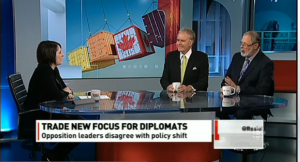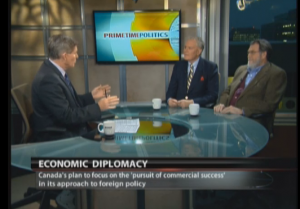Globe Debate: Six experts weigh in on Canada’s shift to the ‘dollar diplomacy’
The Globe and Mail Wednesday, Nov. 27 2013, 11:11 AM EST
A range of opinion on Canada’s global pivot
Six former ambassadors or foreign affairs officials debate the merits of Canada’s new shift of its foreign relations to a focus on trade and commerce. “… All diplomatic assets of the Government of Canada will be marshalled on behalf of the private sector.”
Jeremy Kinsman
A ‘dreadful mistake’
Jeremy Kinsman
This is a proven dreadful mistake. Foreign relations for democratic nations have three thrusts: economic interests; international peace and security; and value-driven support for human rights and democracy development. Their content is increasingly more people to people than state to state.
The moment any one emphasis excludes one or both of the others is the moment things go off the rails; eg., thirty years of the United States supporting a dictator in Egypt for (false) security reasons alone; or for Canada, sucking up to the Gadhafi family to help out SNC/Lavalin.
The United States is now pursuing just such a composite strategy – for Iran, Russia, China; supporting a strategic partnership in the interests of economic and political security, while also supporting civil society’s legitimate aspirations.
Why is this Canadian government so blindly committed to a mercantilist policy without the other thrusts? It’s a proven loser. It is not what Canadians want.
Jeremy Kinsman was Canadian ambassador in Moscow from 1992 to 1996
A ‘refreshing’ pivot
Derek Burney
The “Global Markets Action Plan” announced Wednesday by Trade Minister Ed Fast is a refreshing statement of the obvious
Trade is the lifeblood of the Canadian economy and should be a major instrument of Canadian foreign policy, not to the exclusion of others, but because it is the one on which our scope for influence is actually commensurate with our strengths, hence our relevance and our leverage.
The objective is to enhance and safeguard our economic prospects. While much of the emphasis in the latest plan seems to be on trade promotion – support for small and medium-sized enterprises, etc. – the essence will flow from trade negotiations, as was the case in the past with the U.S. free-trade agreement and the North American free-trade agreement and, most recently, CETA – the most significant accomplishment on trade since NAFTA.
The focus should now most definitely switch to specific emerging markets, notably those in Asia which are today delivering much of global, economic growth. The real action will be at the negotiating tables.
Not a policy for the real world
Gar Pardy
Poor Willy Loman. Arthur Miller’s archetypical salesman died more than sixty years ago by his own hand. He is now revived by the government of Canada in a play of desperation to give new energy and life to the Canadian economy on the backs of the Canadian Foreign Service. Never have public servants been loaded with such an onerous responsibility; and before we get carried away with the rhetoric of the government and the clapping flippers of its trained seals, Canadians should take a walk in the real world where the Canadian coin is of less value than the CFA franc of the Central African Republic.
The antecedents of this policy are not hard to find. The dismantling of the Canadian International Development Agency, putting the International Development Research Centre on life support, the bad-mouthing of the Commonwealth and threats to cut Canadian support funding, the back-of-the-hand treatment for the United Nations and a visceral disdain for the Foreign Service have all been large signposts of the illusory world this government has created.
Now Canadians are expected to accept that “All diplomatic assets of the Government of Canada will be marshalled on behalf of the private sector.” This is more than just changing the channel. It is throwing out the television and expecting the world to accept the ethereal messages this prone government receives from its self-created cosmos.
It has been evident for some time that this is a government that lives in an illusory universe where science plays on role and reasonableness has been eliminated from its DNA. As such, not surprisingly, it can today with a face straight say to a complex world that Canada cannot be counted on to do anything more than to “marshal” its foreign service in support of its business community.
It is a policy that is constructed on the shifting sands of ignorance of the international scene and sleigh-of-the-hand illusions to fool Canadians. To suggest that there is a “Canadian” business community is to deny a central Canadian illusion. There is hardly a large Canadian company that is today not controlled by foreign interests and supported by hidden Canadian subsidies of policy and money. Even more insidious is that many of these foreign interests are the products of foreign governments whose interest in things Canadians do not go beyond their wallets and their own national interest.
So today we resurrect Willy Loman from his long forgotten garage and give him new life as the guardian of Canadian foreign policy. With apologies to Joe Clark we now will “lecture, peddle and leave.”
Gar Pardy is a former ambassador who comments on public policy issues from Ottawa.
Read more +
We are a nation of traders
Colin Robertson
‘Economic diplomacy’ is nothing new – we opened our first foreign offices to promote trade and attract talent to Canada. Canada has always been a trading nation.
With the pivotal 1988 free-trade election, when we opted for competition rather than protection, we are becoming a nation of traders. We have shown ourselves that we can compete successfully around the globe drawing on our natural endowments and the skills of our people.
One of the keys to success is finding our niche in the supply chain dynamic that now characterizes global trade. We generate half our income from commerce by selling what we make in our factories or harvest from the land. Increasingly we sell our services as engineers and bankers to the world.
Our ability to keep our edge in global competition will largely determine our future prosperity. ‘Economic diplomacy’ is important but it is only one element in sustaining our economic health.
First, we need to put more emphasis on practical skills and training. This means recognizing the vital contribution of those who use their hands as well as their heads and giving greater weight to community colleges and technical schools that train tomorrow’s plumbers and welders, electricians and machinists.
Second we have to sustain a healthy population through an affordable, universal health care system.
Third, we need to nurture our pluralism through smart immigration. We are peopled by the world. In Toronto, our biggest city, half were born outside of Canada.
As we approach our sesquicentennial remember the words inscribed over the Canadian Pavilion at Expo 67: “Rights are the Rewards of Responsibility.”
Economic diplomacy makes sense but as one piece in a larger design of an active, pragmatic internationalism. This requires a ‘best in class’ Foreign Service that can deliver ‘economic diplomacy’.
The strife that led to this year’s six-month strike has been settled but the relationship between the Government and its Foreign Service can be characterized as ‘mutual contempt’.
If the Government is to deliver on its economic policies then it needs to devote some attention to rejuvenating its Foreign Service. Invest in training and trust it to use the new tools – twitter, blogs and Facebook. Open up recruitment at all levels from the private sector and the provinces.
The practical success of economic diplomacy will depend on creating mutual trust with those who have to deliver on its promise.
Our economic diplomats should also take their inspiration from one of our greatest Trade Ministers, George Hees. He sent forth an earlier generation of Canadian salesmen and saleswomen with the instruction: “You can’t do business sitting on your ass.”
A former diplomat, Colin Robertson was a member of the teams that negotiated the Canada-US FTA and NAFTA agreements.
The world won’t allow for a simple focus on trade
Paul Heinbecker
The world will not let us focus on economics and trade even if it were a good idea for us to do so.
From natural disasters such as Typhoon Haiyan and the Haitian earthquake to man-made calamities such as 9/11 and Syrian civil war, events will force us to respond. Further, Canadians’ interests and our values will demand we pay attention to, for example, the Iranian nuclear program, cyber security, pandemics and the spread of communicable diseases, international crime and the drug trade, climate change and Arctic sovereignty, the alleviation of hunger and promotion of human rights and religious freedoms as well as improving global governance notably preserving Internet freedom.
To say nothing of assisting Canadians abroad who are sick and need help. Mercantile policy will not get Canadia tourists out of hell hole jails or repatriate the deceased.
Nor will it alone burnish Canada’s reputation as a constructive, responsible global citizen.
Paul Heinbecker is now with the Centre for International Governance Innovation
A not-so-simple shift
Derek Fraser
If the government is serious, then what it proposes would amount to a revolution, for this government has up until now often given priority over trade and investment prospects to its support for human rights, humanitarian aid, and international security.
Canada’s support for the Western humanitarian intervention to get rid of Colonel Gadhafi harmed the commercial interests of a leading Canadian engineering firm. Canada’s criticism of the Sri Lankan government and Canada’s boycott of the Commonwealth Heads of State in Colombo cannot have helped Canadian business prospects in Sri Lanka. Canada’s support for international sanctions against Iran and North Korea because of their nuclear ambitions has not helped Canadian commercial interests in either country, notably those of the Canadian nuclear industry.
Canada’s support for Israel cannot further our business possibilities in the Arab world, which are probably larger than those in Israel. Canadian support for democracy, human rights and national independence in Eastern Europe, notably Ukraine, cannot endear us to the Russians. Appointing an Ambassador for Religious Freedom and supporting women’s rights may actually harm business interests in certain countries. The commercial fallout from sending the Dart Team to the Philippines in the aftermath of Typhoon Haiyan may turn out to be disappointingly small.
If the Government does not mean what it appears to say, then it might consider embarking on a serious and balanced analysis of all the strands of our foreign policy. Such an analysis would likely recognize that other interests sometimes take precedence over commerce.
Derek Fraser is a former ambassador to Hungary, Greece and Ukraine.











